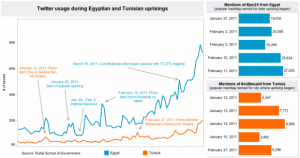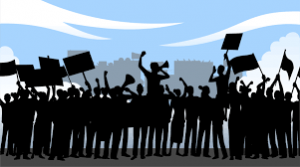Today we will discuss the effect social media has had on traditional forms of protesting such as riots. Years ago it would have seemed impossible to organize a protest over the internet yet as time and social media sites have developed most of the organised protesting we see know days has been arranged prior via websites such as Twitter, during this blog post will discuss the impacts of sites like twitter on recent riots and protests. The internet has been universally credited with sparking revolution with anything from shopping routines to the fall of some governments. Today we will be discussing the impact it has had on protests like the Arab springs in 2011 and the riots that spread across England also in 2011. Has technology positively or negatively impacted protests and to what extent? Is what will try to be answered here today.

Some background about the Arab spring for those who do not know what it was about, it was a series of anti-government protests and armed riots that expanded across the Middle East in 2011. It started in Tunisia after unrest which eventually turned violent. The protests were successful across many countries causing fundamental change across many countries and toppling several governments including Tunisia’s Zine El-Abidine Ben Ali and Egypt’s Hosni Mubarak who was in power for 30 years. So how do the internet and online activities change the way the protests played out? Well the Arab Spring is often referred to as the Twitter revolution, as the social media platform played a key role in helping spread awareness about ongoing events all over the world, and, online revolutionary conversation often followed by a protest on the ground for both sides (pro/anti – government). it was also an important tool for governments as they could choose how to respond to the protests online reaching millions of people almost instantaneously. However, did social media play a role in creating the uprising or did it merely help organize them, many experts suggest that social media didn’t play an independent role in the protests and was merely a catalyst and it would have happened eventually with or without help from sites such as Twitter.

An argument against the use of social media in activism in general argued in Malcolm Gladwells article “Small Change” is that it leads to low risk activism similar to the argument of sliacktivism as discussed in a previous post, however slightly different what Gladwell agues is that it creates weak ties among participants meaning people only go along with an idea to gain a sense of belonging and participation even thought the cause is not that important to them, establishing a mob mentality protesting in a group for the mere reason of belonging to a group. Gladwell also argues that due to the fact social media is not hierarchically organised it complicates the decision-making process. However, taking into account these arguments in the case of Arab spring protests it is difficult to overlook the many positives that came as a result of them, consider your own opinion and voice them in the comments below. And for those interested in many of the statistics involving civil movements and social media sites like Facebook and Twitter I recommend reading the journal article Arab Social Media report of May 2011.

An example of how the power of social media can be used poorly is the England riots in August of 2011, originally protesting the death of Mark Duggan who was killed by the police it quickly escalated into arson, looting and needless violence. What started as a peaceful protested turned into a full scale riot with much of the blamed pointed to social media by helping the message spread and getting a bountiful crowd many who just showed up just to be part of the crowd or to committed crimes in the name of “Justice”. In addition to this there were a few Facebook pages glorifying the violence encouraging it further. The MET (London metropolitan police) also used twitter as a means of communication during the period warning people to stay inside in high risk areas, this connects the police with the public and although even through twitter the police remained in a controlled and distant position from the public, the presences of the police on twitter and getting real time reassurance and advice decreased the distance of the police to the citizens and may have prevented the protests getting worse with more causalities. Many people believe that social media and news coverage made the riots worse as watching other people loot at ill encouraged more people to join fuelling the chaos. It is not a question of weather social media aided the rioters organise it is how and could it be used for a better cause in addition to what could have been done to prevent it. Simply shutting down social networks would not have worked as it may have lead to more people joining the riots as they have something to protest know. Although the London riots were not a revolution it still shows the power social networking and the internet has when there is large group of people and is a good example of how it could organise people if there was to be revolution. Yet it also shows a few drawbacks of using public sites for example the police could also use it to dissuaded people from participating in addition to shutting down a few planned riots which happened people planned to crash the hackney carnival but police quickly shut the event down. Communication and social networking technology is constantly evolving and may benefit the police rather than the rioters as they have the power of the law behind them. however, although social media may have been voice of the protests as with the Arab Spring how much did It really impact the riots it may have simply been platform to voice the opinions of both sides rather than be the instigator or used to create the riots it may have been as with the Arab Spring a catalyst to the mayhem rather than the troublemaker. It is important to try to find the cause in situations like these rather than simply what correlates with it. Voice your own opinion in the comments bellow do you think social networking sites help or hinder revolutions or are they simply a powerful tool that can be used for good or bad?
Leave a Reply